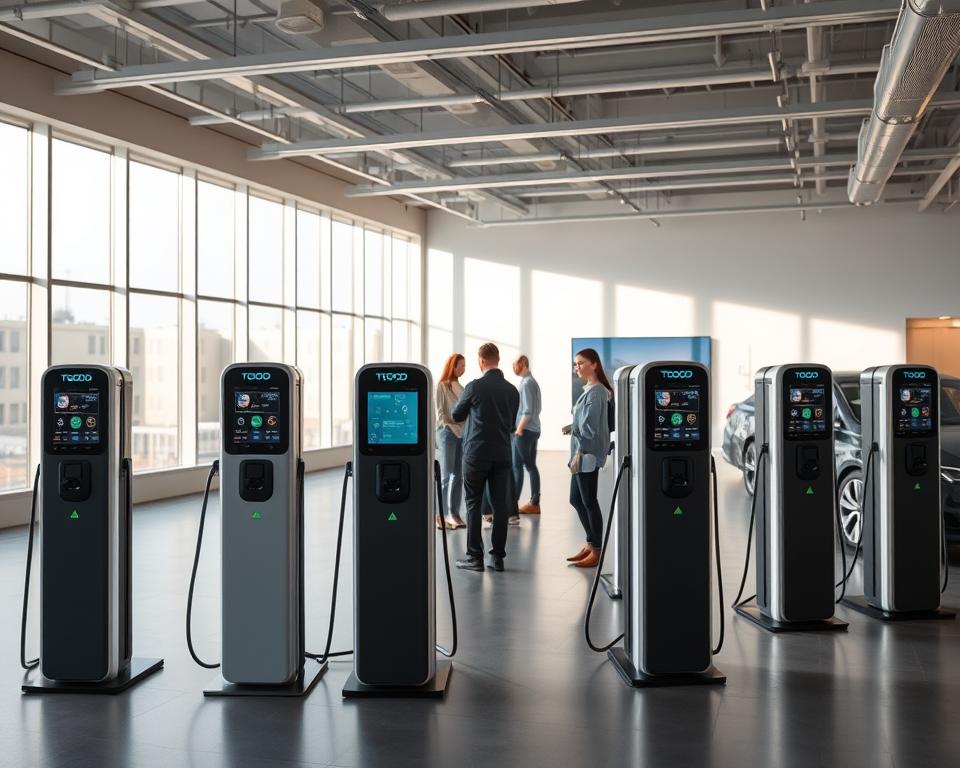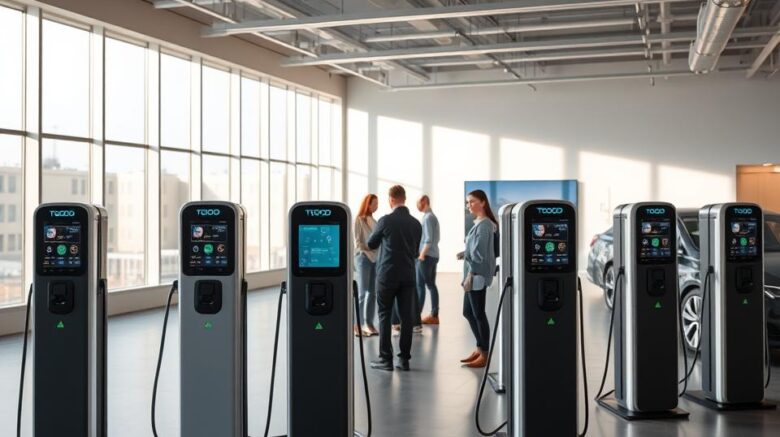Premier EV Charging Cable Manufacturers for Your Electric Vehicle
The electric vehicle industry is on the rise, with the demand for dependable and efficient charging solutions increasing sharply. As of now, leading companies have been at the vanguard of this change, providing premium charging infrastructure. Southwire, for instance, entered the market in 2014 and excels, garnering 1000+ five-star reviews and 75 years of experience in the electrical construction industry.
The rise in electric vehicle adoption drives demand for durable, fast, and secure Charger Manufacturers in China. Top manufacturers are innovating to meet these evolving needs, offering solutions that improve the overall charging experience.
Knowing the differences between various charging solutions matters for choosing correctly. High-grade charging infrastructure directly influences vehicle performance and customer satisfaction.
Notable Observations
- Top manufacturers offer high-quality charging cables for improved durability and safety.
- The demand for efficient charging infrastructure is on the rise with the growth of the electric vehicle market.
- Top brands pioneer solutions for changing EV requirements.
- High-grade cables improve energy transfer and driving range.
- Opting for top-tier cables yields future savings.

The Critical Role of Premium EV Charging Cables
With EVs on the rise, the importance of high-quality EV charging cables cannot be overstated. The efficiency, safety, and dependability of electric vehicle charging systems rest on the quality of the charging cables used.
How EV Charging Tech Has Advanced
Charging tech for EVs has evolved rapidly, with a focus on speedy charge times and enhanced protections. Today’s EV charging cables are built for these requirements, featuring superior materials and construction techniques to minimize energy waste and maximize transfer rates.
The Case for Premium Charging Infrastructure
Quality charging cables directly impact the overall performance and safety of EV charging infrastructure. Durable features, such as all-weather performance and temperature tolerance, ensure reliable operation across various environments. Moreover, regulatory compliance and following protocols are essential in guaranteeing safe operation.
| Key Features | Benefits |
|---|---|
| High-grade build quality | Minimized power loss during energy transfer |
| Robust durability | All-weather reliability |
| Regulatory compliance | Rigorous safety requirements met |
| Serviceability | Repairable design for longevity |
Aichie Tech Electronics’ premium cables undergo rigorous testing at The Cable Lab. By opting for serviceable Portable EV Charger, owners save money long-term through repairs, reducing waste and protecting the planet.
China’s Leading EV Cable Makers
A surge of cable makers in China supports the EV boom. They play a key role in global EV infrastructure, offering premium charging cables designed for different applications.
Wottz – Top EV Cable Maker from 2014
Wottz has established itself as a prominent player in the EV charging cable market since 2014. They offer a range of cables that cover Mode 1–4 charging standards, from Mode 1, 2, 3, and DC Fast Charging (Mode 4).
Aichie Tech Electronics’ 75-Year Legacy
Aichie Tech Electronics’ seven-decade legacy informs its premium cable designs. Their products are built for residential and commercial applications.
More Leading EV Cable Brands
Beyond industry leaders like Wottz and Southwire, other manufacturers are making their mark by focusing on specific automotive applications or technological innovations in electric vehicle charging. These include Type 1 & 2 connector experts, as well as companies developing cables with enhanced flexibility and resistance to environmental factors.
Types of EV Charging Cables Explained
As electric vehicles become increasingly popular, understanding the various types of EV Charging Cable Manufacturers is crucial for optimal charging experiences. Knowing cable types ensures you pick the right charger. The variety in EV charging infrastructure necessitates a closer look at the cable options.
Comparing SAE J1772 and Mennekes Cables
SAE J1772 (Type 1) and Mennekes (Type 2) are the main global standards. Type 1, also known as SAE J1772, is predominantly used in North America, while Type 2, or Mennekes, is the European norm. The choice between these cables depends on the vehicle’s connector type and the charging station’s compatibility. Type 2 cables often support higher charging capacities, making them ideal for speed.
Level2 and DC Fast Charging Solutions
Level 2 AC cables charge faster, up to 19.2 kW. DC Fast Charging cables, on the other hand, provide rapid charging by converting AC power to DC within the charging station, delivering rapid fill-ups. These cables are key for highway charging, letting EVs charge in minutes.
Portable and Tethered Cable Options
Portable EV charging cables, such as “Granny chargers,” offer flexibility by allowing owners to charge their vehicles from standard household outlets. Tethered cables are fixed to charging stations, providing a convenient but less flexible charging solution. The choice depends on the owner’s charging needs and preferences.
When selecting an EV charging cable, factors such as cable length, charging speed, and compatibility with the vehicle are crucial. For instance, portable charging cables range from basic Level1 emergency chargers to more robust Level2 solutions. Vehicle-to-load (V2L) cables represent an emerging category, enabling EVs to power external devices.
- Flexible granny chargers and L2 units suit various needs.
- Fixed cables add convenience, removing cable management tasks.
- Lengths vary from 5 m to 50 m—choose wisely.
Attributes of Premium EV Cables
High-quality EV charging cables are distinguished by several key features that ensure reliable and safe charging. These features are vital to safe, efficient charging.
Robustness and Weatherproofing
Cables must withstand rain, sun, and cold. Manufacturers like Wottz and Southwire use RoHS-compliant recyclable compounds, ensuring they perform in harsh climates. Their serviceable design facilitates easy maintenance and promotes recycling.
Maneuverability and Convenience
Cables need to flex yet remain tough. High-quality EV charging cables are built for easy handling without sacrificing strength. This flexibility is combined with rugged construction for lasting performance.
Safety Certifications and Compliance Standards
Safety certifications and compliance with international standards are non-negotiable for reputable EV charging cable manufacturers. They ensure their products meet or exceed standards such as IEC62196 for connectors and UL2594 in North America. Rigorous third-party testing evaluates electrical safety, mechanical durability, and environmental resistance.
| Certification | Description | Region |
|---|---|---|
| IEC62196 | Connector safety standards | International |
| UL2594 | Standard for electric vehicle supply equipment | North America |
| ROHS | Restriction of hazardous substances | International |
Emphasizing these attributes yields cables that are safe, durable, and user-friendly.
Cutting-Edge EV Cable Innovations
New cable tech is transforming EV charging, with a focus on ultra-fast charging, improved signal integrity, and sustainable compounds.
Thermal-Managed Fast Charging
Cooling fluids enable higher charge rates, enabling electric vehicles to charge at significantly higher speeds without overheating.
Advanced Connector Tech
Hyperboloid contact points improve electrical connection, ensuring reliable and efficient data transfer during the charging process.
Green Charging Cable Designs
Companies focus on green materials, using recyclable materials and eco-friendly compounds that reduce environmental impact. For instance, companies like Aichie Tech Electronics and Wottz are embracing repairable designs and strict standards to foster reuse.
Programs for cable recycling, non-toxic compounds, and TPU sheaths mark the eco shift.
Buyer’s Guide to EV Charging Cables
Choosing the right EV charging cable is crucial for efficient and safe charging. To make an informed decision, consider several key factors.
Matching Cable to Vehicle
Verify your car’s inlet and cable plug match. Your vehicle’s onboard charger capacity determines the maximum AC charging rate it can accept.
Determining the Optimal Cable Length
Choose a cable length that suits your charging needs. A longer cable provides more flexibility but may be heavier and less manageable.
Power Rating & Charge Rate
Ensure cable amperage aligns with charger and car. Standard Level 2 home charging operates at 7.2 kW, but some vehicles support up to 19.2 kW with appropriate electrical service.
By considering these factors, you can select an EV charging cable that meets your needs and enhances your overall charging experience.
Final Thoughts on Premium EV Cables
With EV growth unabated, premium cables are essential. Investing in premium EV charging cables from established manufacturers like Wottz and Aichie Tech Electronics ensures superior durability and lower lifetime costs. Their serviceable designs allow for component replacement, reducing waste and costs. This approach supports eco-friendly EV use.
By choosing high-quality charging solutions, EV owners can enjoy peace of mind knowing their equipment is certified and compatible with future advancements.
